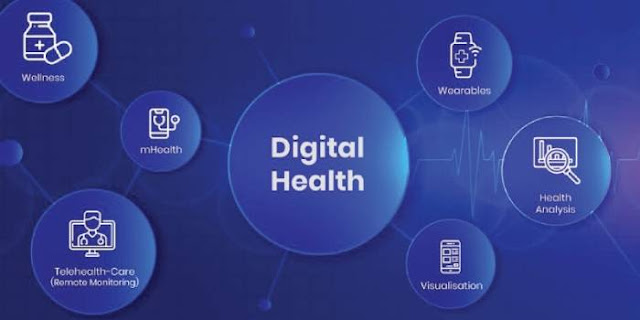What is Digital Health?
Digital health mentions to the use of digital technologies, information, and communication systems to enhance the efficiency, effectiveness, and delivery of healthcare services. It represents a transformative shift in the way healthcare is managed, delivered, and experienced. The addition of digital health technologies into the healthcare ecosystem aims to improve patient outcomes, increase accessibility, reduce costs, and enhance overall healthcare quality.
One fundamental aspect of digital health is the digitization
of health records. Electronic Health Records
& Electronic Medical Records have replaced traditional paper-based
systems, allowing healthcare providers to store, manage, and exchange patient
information more efficiently. This digitization streamlines communication among
different healthcare entities, leading to better-coordinated care and reduced
chances of errors. Patients also benefit from easier access to their medical
history and improved communication with healthcare providers.
Telemedicine is another critical component of digital
health, especially notable for its transformative impact on the delivery of
healthcare services. Telemedicine leverages communication technologies to
facilitate remote consultations between healthcare professionals and patients.
This is particularly valuable in situations where physical presence is not
necessary, such as routine check-ups, follow-up appointments, or consultations
for minor ailments. The widespread adoption of telemedicine has become
especially significant in improving healthcare accessibility, particularly in
remote or underserved areas.
Wearable devices & mobile health applications are key
players in the digital health landscape. Wearables, like fitness trackers and
smartwatches, collect real-time health data, such as heart rate, activity
levels, & sleep patterns. This data can be used by individuals to monitor
their own health and wellness. Additionally, healthcare providers can leverage
this information to track patient progress, personalize treatment plans, and intervene
early in case of potential health issues. Mobile health apps offer a wide range
of functionalities, from medication reminders to mental health support,
providing users with tools to actively manage their health and well-being.
Artificial Intelligence (AI) & machine learning are
increasingly integrated into digital health solutions, offering advanced
analytics and predictive capabilities. These technologies can analyze vast
amounts of healthcare data to identify patterns, predict disease outbreaks, and
personalize treatment plans. AI-driven diagnostic tools can assist healthcare
professionals in making more accurate and timely diagnoses, improving overall
patient outcomes.
Interoperability is a critical consideration in digital
health. The seamless exchange of information among different systems and
platforms ensures that healthcare providers have a comprehensive view of a
patient's health history, regardless of where the data originates.
Interoperability enhances care coordination, reduces duplication of tests, and
supports informed decision-making.
Cybersecurity is a paramount concern in the digital health
landscape. The increasing reliance on digital technologies exposes healthcare
systems to potential security threats. Protecting sensitive patient information
and maintaining the integrity of health data are essential for ensuring trust
in digital health solutions. Robust cybersecurity measures, including
encryption, access controls, and regular security audits, are imperative to
safeguard patient privacy and maintain the confidentiality of healthcare
information.
Patient engagement is a key aspect of digital health that
empowers individuals to actively participate in their own healthcare. Patient
portals, online communities, and educational resources contribute to informed
decision-making and encourage individuals to take a extra proactive role in
managing their health. Enhanced communication between patients and healthcare
providers fosters a collaborative approach to care, leading to better health
outcomes.
Despite the numerous advantages, challenges exist in the
widespread adoption of digital health. These include issues related to data
privacy, regulatory compliance, reimbursement models, and the digital divide,
where certain populations may lack access to the necessary technologies.
Policymakers, healthcare providers, technology developers, and other
stakeholders must collaborate to address these challenges and create an
environment conducive to the successful integration of digital health
solutions.
Digital Health Disadvantage
While digital health presents numerous advantages, it also
comes with several disadvantages. Privacy and security concerns arise as health
data becomes increasingly digitized, with the potential for unauthorized access
and data breaches. The digital divide poses a significant challenge, as not all
populations have equal access to the necessary technologies, exacerbating
healthcare disparities. Reliance on technology may main to a loss of the human
touch in patient care, impacting the doctor-patient relationship.
Additionally, the rapid pace of technological advancements can result in challenges related to the standardization and interoperability of
digital health solutions. Regulatory hurdles, including compliance with
evolving laws and standards, can impede the seamless integration of digital
health into existing healthcare systems. Addressing these drawbacks requires a
concerted effort to implement robust cybersecurity measures, bridge the digital
divide, and carefully navigate the ethical implications of technology in
healthcare.
Conclusion
Digital health represents a paradigm shift in healthcare, leveraging technology to enhance efficiency, accessibility, and quality of care. From electronic health records to telemedicine, wearables, & artificial intelligence, digital health solutions offer a diverse array of tools to improve patient outcomes and transform the healthcare landscape. Embracing the opportunities presented by digital health requires addressing challenges and fostering collaboration among stakeholders to ensure a future where technology plays a central role in delivering patient-centered, efficient, and equitable healthcare.



